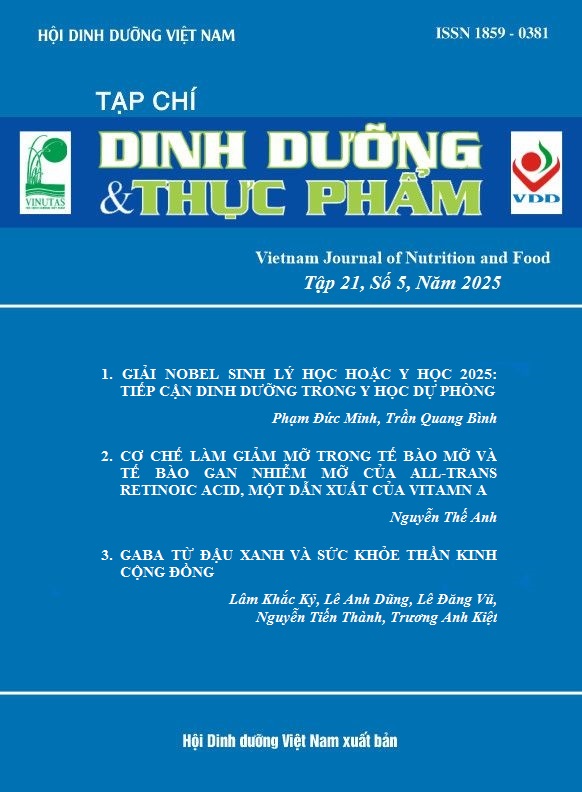ĐÁNH GIÁ KHẨU PHẦN ĂN ĐƯỜNG MIỆNG CỦA BỆNH NHÂN SAU PHẪU THUẬT CẮT GAN TẠI BỆNH VIỆN K NĂM 2025
Nội dung chính của bài viết
Tóm tắt
Mục tiêu: Đánh giá khẩu phần đường miệng của bệnh nhân sau phẫu thuật ung thư gan tại Bệnh viện K nhằm xác định mức đáp ứng nhu cầu dinh dưỡng để cải thiện chăm sóc dinh dưỡng.
Phương pháp: Nghiên cứu mô tả cắt ngang trên 34 bệnh nhân sau phẫu thuật gan. Dữ liệu khẩu phần ăn đường miệng được thu thập thông qua phương pháp hỏi ghi 24 giờ bằng phỏng vấn trực tiếp, thành phần dinh dưỡng được phân tích bằng phần mềm Eiyokun Việt Nam và đối chiếu theo khuyến nghị của ESPEN.
Kết quả: Năng lượng khẩu phần đường miệng của bệnh nhân sau phẫu thuật gan đạt trung bình mỗi ngày là 958,4 ± 277,6 kcal/ngày. Tỷ lệ đáp ứng nhu cầu năng lượng và protein tăng dần, trung bình mỗi ngày nằm viện đạt lần lượt là 55,0 ± 16,0% và 60,6 ± 18,5%. Tính trung bình mỗi ngày sau phẫu thuật chỉ có 11,8% BN đạt được nhu cầu năng lượng và 2,9% bệnh nhân đạt được nhu cầu protein . Tỉ lệ cung cấp năng lượng từ các chất dinh dưỡng: Glucid (49,5% - 56%), Protein (15,9% - 19,2%), Lipid (24,9% - 33,5%). Nhóm bệnh nhân được ra viện sớm hơn có năng lượng trung bình của khẩu phần đường miệng cao hơn.
Kết luận: Tỉ lệ khẩu phần đường miệng của bệnh nhân sau phẫu thuật gan những ngày đầu đạt được nhu cầu dinh dưỡng khuyến nghị còn thấp. Do đó, dinh dưỡng cho bệnh nhân sau phẫu thuật vẫn cần chú ý bổ sung thêm qua dinh dưỡng đường tiêu hóa và/hoặc tĩnh mạch và cần cá thể hóa.
Từ khóa
Khẩu phần 24h, sau phẫu thuật, ung thư gan, Bệnh viện K
Chi tiết bài viết
Tài liệu tham khảo
2. Liu Y and Xue X. Systematic review of peri-operative nutritional support for patients undergoing hepatobiliary surgery. Hepatobiliary Surg Nutr. 2015;4(5):30412–30312.
3. Gillis C, Nguyen TH, Liberman AS, Carli F. Nutrition adequacy in enhanced recovery after surgery: a single academic center experience. Nutr Clin Pract. 2015;30(3):414-419.
4. Constansia RDN, Hentzen JEKR, Hogenbirk RNM, et al. Actual postoperative protein and calorie intake in patients undergoing major open abdominal cancer surgery: A prospective, observational cohort study. Nutr Clin Pract. 2022;37(1):183–191.
5. Bach HV, Thao NT, et al. Nutritional status and diet of preoperative and 7 days postoperative patients with colorectal cancer at National Cancer Hospital 2018-2019. J Public Health Nutr. 2020;3(3):235-240.
6. Phạm Thị Hương Len, Nguyễn Lê Tuấn Anh, và cộng sự. Tình trạng dinh dưỡng và chế độ nuôi dưỡng bệnh nhân phẫu thuật đường tiêu hóa tại khoa ngoại Bệnh viện Đại học Y Hà Nội năm 2016-2017. Tạp chí Dinh dưỡng và Thực phẩm. 2018;14(4):86-93.
7. Bischoff SC, Bernal W, et al. ESPEN practical guideline: Clinical nutrition in liver disease. Clin Nutr. 2020;39(12):3533–3562.
8. Li Q, Ding C, Cao M, et al. Global epidemiology of liver cancer 2022: An emphasis on geographic disparities. Chin Med J (Engl). 2024;137(19):2334–2342.
9. Nguyễn Hồng Trang, Nguyễn Tuấn Anh, Nguyễn Việt Linh và cs. Đánh giá kết quả của phương pháp giảm đau sau mổ đa mô thức trong chăm sóc bệnh nhân phẫu thuật cắt gan. Tạp chí Y Dược Lâm sàng 108.2024;83-91.
10. Benjamin ER, Dilektasli E, Haltmeier T, et al. The effects of body mass index on complications and mortality after emergency abdominal operations: The obesity paradox. Am J Surg. 2017; 214(5):899–903.


